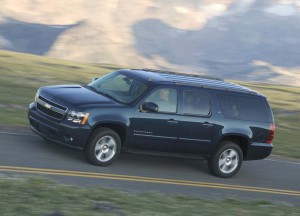Already the largest safety campaign in automotive history, seven automakers have added another 4.4 million vehicles to the list of cars, trucks and crossovers recalled due to defective Takata airbags.
Since mid-May, the figure has grown by more than 16 million vehicles, and that’s on top of the 24 million covered by a recall ordered by the National Highway Traffic Safety Administration last autumn. And since NHTSA plans a phased campaign, millions more Takata airbags are expected to be recalled over the next two years.
The latest move impacts BMW, Daimler, Ford, General Motors, Jaguar-Land Rover, Mercedes-Benz and Volkswagen. But virtually every major automaker, and even smaller ones like Ferrari, have been touched by the ongoing crisis caused by airbags that can explode with deadly force. Of the makers involved in the latest action, GM has the largest numbers of vehicles impacted, about 1.9 million.
A total of 13 deaths have so far been linked to the problem, 10 of those in the U.S. The problem is that Takata airbags can aggressively over-inflate when triggered by a crash, spewing plastic and metal shrapnel into the passenger compartment.
The exact cause of the problem remains something of a debate. It was originally blamed on a manufacturing defect at two North American plants run by the Japanese supplier and was thought to be limited to regions of high heat and humidity, such as Southern Florida. But the problem has proved to be more widespread and an industry research group has since faulted the explosive ammonium nitrate used by Takata to power its inflators.
All told, NHTSA announced last month that it would add another 35 million to 40 million airbags to the original recall list. The precise number of vehicles that will impact is unclear, as some use more than one of the suspect Takata devices.
The safety agency continues to prioritize the recall, focusing first on older vehicles, as well as those in regions like Southern Florida, largely because of a shortage of replacement parts. In fact, NHTSA is allowing some automakers, including Toyota and BMW, to use newer versions of the suspect airbags as temporary replacements for older bags. The theory is that the risk of a malfunction increases with age. But those vehicles will eventually be faced with a second recall once newer, safer bags are available.
(Automakers continue to install defective Takata airbags. For more, Click Here.)
Under the May order, vehicles made in 2011 or before and operated in regions of high heat and humidity will be recalls first. Then, models dating to 2008 or before and sold in Southern-tier states will be affected. Finally, vehicles sold in the rest of the country and built before 2004 will be recalled. Automakers can broaden the initial recall, if they wish, and Fiat Chrysler last week included over 1 million more vehicles than NHTSA required.
The airbag recall has put Takata under a severe financial strain and the company is reportedly looking for a buyer. Media reports have suggested takeover specialist Kohlberg Kravis Roberts could step in.
(For more on that possible sale, Click Here.)
The crisis has also put a spotlight on the broader issue of automotive safety. Recalls have now hit record numbers for two years in a row and 2016 could follow that pattern. But large campaigns, like the one targeting Takata airbags, has put a strain on the ability of suppliers to come up with the necessary replacement parts, and the capacity of dealer service departments to complete repairs in a timely manner.
So far, only about a quarter of the vehicles covered by last year’s Takata recall have been repaired. But while that’s an extreme situation, it is not entirely unique. And efforts to ensure all recalled vehicles get repaired has been complicated by consumer resistance. According to tracking firm CarFax, more than 35 million vehicles on U.S. roads have at least one unrepaired defect covered by a safety recall.
There’s growing pressure to find a solution and on Wednesday, a new federal law went into effect that bans rental car companies from fielding vehicles with unrepaired defects. Similar efforts aimed at preventing dealers from selling unrepaired cars have so far faltered, though the nation’s largest dealer chain, AutoNation, has taken that step unilaterally.
(For more on the Safe Rental Car Act, Click Here.)


